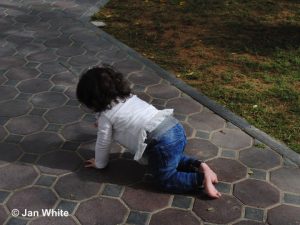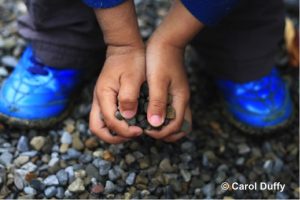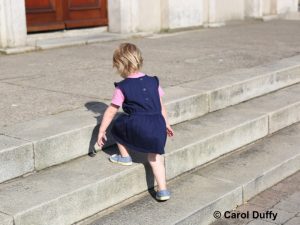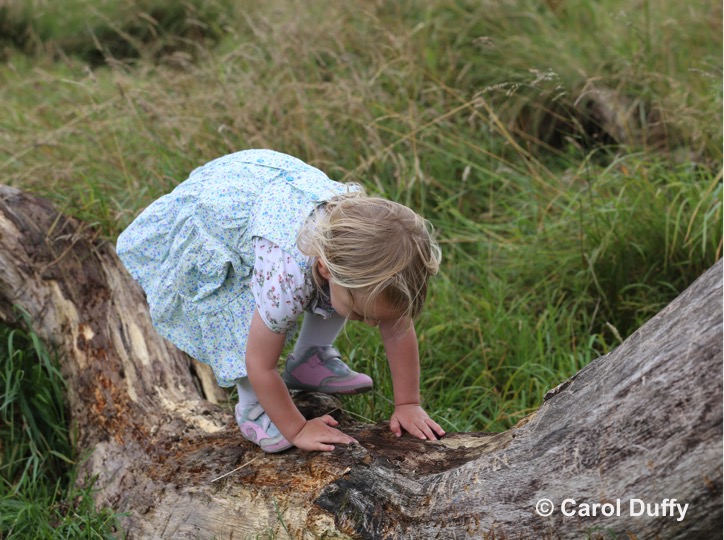An important strand of work for Early Childhood Outdoors is to support and share developments in good quality training opportunities at all levels, so that practitioners can enhance their understanding and practice across relevant areas and along a continuum of levels. Freedom, stimulus and possibility for moving and being physical is of course one of the central reasons children love to be outside – and a very important area for pedagogical development in outdoor practice. So, I’m delighted to be able to share longtime ECO friend Lala Manners’ news that this free online course is now ready to roll! (Details of Lala’s excellent new book are at the end of this post.)
Public Health England (PHE) in partnership with The Open University is calling on the early years workforce to engage in the first presentation of its new online physical development (PD) course that starts from Monday 27th July (you can register now, and start the course anytime after this start date).
Funded by Health Education England, ‘Supporting Physical Development in Early Childhood’ is a free-to-access course that is 18 hours long, divided into three-hour sessions over six weeks.
The course is hosted on the FutureLearn platform. Each week includes a balance of essential underpinning knowledge and practical advice, with opportunities throughout for students to reflect on their learning with others. ‘The aim is to establish a baseline level of knowledge on which further learning may be built and, in time, to establish a vibrant and supportive community of early years PD specialists,’ said Dr Jackie Musgrave, Programme Lead for Early Childhood at The Open University.

Six themes over six 3-hour modules
The course covers six related areas:
Growth and physical development – looks at the difference between growth and physical development and how these are measured from birth to aged five; what support and advice is available to parents and carers; and the life factors that support or compromise children’s growth and physical development.
Body systems, senses and physical development – covers the development of young children’s senses and body systems; the importance of these working together to ensure smooth overall development; and how to provide sensory-rich environments for babies and young children.
Supporting the development of children’s movement skills – explores how to develop fine and gross motor skills and how these may be best supported in practice; how children may progress from the initial experience of a new skill to a mature and fluent version; and why early movement experience provides the critical foundations for later successful and enjoyable engagement at school.

Movement and learning – explores how movement skills underpin and support learning across all developmental domains; how these skills emerge according to children’s unique inner timetable; the adult role in supporting children’s physical development; and how typical patterns of movement behaviour emerge in each age group.
Physical development and play – looks at the importance of physical play in supporting children’s physical development; how risky and rough-and- tumble play can be promoted safely and effectively; the environments that best support physical play; ‘movement-rich’ environments and the adult role; and ways to encourage local collaboration and community engagement.
Movement and health – giving advice on how children with underlying conditions or particular medical needs, such as diabetes, asthma, obesity, visual impairment, may be supported in their movement experience and fully included in all physical activities; what support is available; and how to engage parents and carers proactively in their children’s physical development.

Seeking feedback
Dr Musgrave explained, ‘We want this course to be as useful and effective as possible and to ensure that it meets the needs of practitioners who are seeking knowledge about promoting the physical activity and development of babies and young children.
We need feedback so that we can make any recommended amendments to the course. We are now seeking the support of practitioners to take part in the first presentation. We will be asking them to complete a survey that will give us the feedback we need to make any improvements.’
‘The overall health and well-being of our young children is of increasing concern,’ added Dr Lala Manners, who is director of Active Matters and was involved in developing the course. ‘Their level of physical activity remains stubbornly low, obesity rates in this age group are high and opportunities for children to be physically active are compromised by curricular demands, enticing technology and the lack of safe and accessible outside spaces.’
If you would like to take part, the survey is at the end of the course. We will really appreciate your feedback.
Find out more on the Active Matters website
To take part visit Future Learn
Lala Manners’ excellent book The Early Years Movement Handbook (2019 Jessica Kingsley) is recommended by Early Childhood Outdoors and available with a 10% discount on RRP and free postage from Books Education


